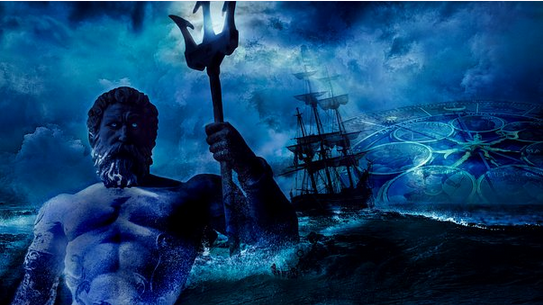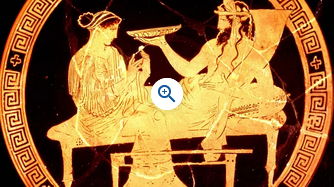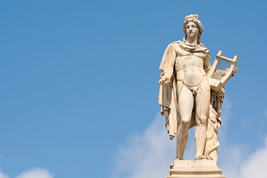12 Greek Gods and Goddesses
We do not endorse any religious beliefs for this article. This article has been written on the basis of various legends.
Cruel and fickle, passionate and vindictive, jealous and insecure, petty and mad: the inhabitants of Mount Olympus represent an attempt by the ancient Greeks to explain the chaos of the universe through human nature. Thus, like every god invented before and after, these gods and goddesses are the embodiment of human solitude. (Surely a giant, grumpy man in the sky struck with lightning…obvi. I mean, what else could it be?) His tales of fighting, sparring and sexual conquest indelibly inspired Western language and imagination. shaped the curriculum. affected by. Here’s a selection of some A-list names from the Greek pantheon.
1-zeus
With the help of Hades and Poseidon, Zeus overthrew his father, Cronus, king of the Titans, and became the chief deity in a new cult, consisting mostly of his siblings and children. In addition to controlling the weather, Zeus was also known for his chronic infidelity to his sister-wife Hera. Among the consequences of his weakness for mortal women was Helen of Troy. His Roman counterpart was Jupiter.
 |
| IMAGE CREDIT-PIXABY.COM |
2- Poseidon
Poseidon is best known as a Greek sea god, but he was also the god of horses and earthquakes. (Thus, many of their temples were inland.) And they had some seriously weird kids. Although humanoid, they gave birth to both the winged horse Pegasus (by Medusa, no less) and Cyclops Polyphemus, who was blinded by Odysseus and his crew in the Odyssey. His Roman counterpart was Neptune.
 |
| IMAGE CREDIT-PIXABY.COM |
3-Hermes
Like the gods of the Greek pantheon, Hermes presided over several regions. He was a shepherd, responsible for guarding livestock, and was also associated with fertility, music, luck and deceit. In the Odyssey, he is depicted as a messenger god. His Roman counterpart was Mercury.
 |
| IMAGE CREDIT-PIXABY.COM |
4-hera
The queen goddess of Olympus, Hera was both the sister and wife of Zeus. Although she is often portrayed as reserved and ascetic, her husband was mercilessly vengeful when it came to [many] extramarital adventures. Unfortunately for the objects of Zeus’ divine love, Hera tormented “other women” (and their progeny, including Heracles) rather than Zeus. His Roman counterpart was Juno.
 |
| IMAGE CREDIT-PIXABY.COM |
5-hadas
Paatal Lok ruled the world of the dead, with which he was sometimes synonymous. The chill God of the underworld was among the few Greek gods who came across as merciless. He was not the final judge of the spirits wandering in his territory nor did he fulfill their punishment for the sins committed during his mortal life. However, he was clever; He tricked Persephone into eating the seeds of the enchanting pomegranate so that he would have to live with her for a part of the year.
 |
| IMAGE CREDIT-PIXABY.COM |
6-Dionysus
Dionysus was the son of Zeus who was born to a mortal mother. When Zeus accidentally killed him, he sewed the young Dionysus to his thigh and, when the young god emerged, sent him to look after Mendon. The cult of Dionysus revolved around intoxication, sex, and barbaric ritual sacrifice. He was often symbolized by a bull because of his association with the sacrificial animal. Elements of his character are seen in Bacchus, the Roman god of wine.
 |
| IMAGE CREDIT-PIXABY.COM |
7- Demeter
Demeter, an agricultural goddess, was the mother of Persephone, who was kidnapped by Hades, the god of the underworld, to be his bride. In search of his stolen daughter, he accepts the hospitality of the royal family of Eleusis. The Eleusinian Mysteries, perhaps the most important religious rites in ancient Greece, are attributed to his teachings. His Roman counterpart was Ceres.
 |
| IMAGE CREDIT-BRITANNICA.COM |
8-Apollo
Artemis’ twin brother, Apollo was the most important (read: feared) of the gods. The son of Zeus, he transmitted the will of his divine compatriots through various means, especially oracles. The oracle of Delphi was his mouthpiece; A 2001 study determined that the oracle was possibly hallucinating due to ethylene gas rising from rocks beneath the temple.
 |
| IMAGE CREDIT-PIXABY.COM |
9-Ares
Ares was the god of bloodshed. (His half-sister Athena represented the more “noble” aspects of warfare and civilian conduct during the war.) Although his fellow gods did not particularly like him, the Spartans had no problem with some prisoners of war. Donations for his worship. And sacrificing dogs…Yeah, that’s right, Ares loved dead puppies. Shock. His Roman counterpart was Marso
 |
| IMAGE CREDIT-BRITANNICA.COM |
10-Artemis
Artemis was the fleet-footed goddess of the hunt. Often depicted in paintings and sculptures alongside a deer or hunting dog, she was both a hunter and a protector of the living world. her Roman counterpart was Diana
 |
| IMAGE CREDIT-BRITANNICA.COM |
11-Athena
Athena was the goddess of reason, wisdom and war. She famously came out completely out of the forehead of Zeus. A key figure in the Odyssey, in which he instructed Odysseus, he guided Perseus and Heracles through their trials. The Parthenon was his main temple in Athens, which is named in his honor. Its Roman counterpart was Minerva.
 |
| IMAGE CREDIT-BRITANNICA.COM |
12-Aphrodite
 |
| IMAGE CREDIT-BRITANNICA.COM |
Aphrodite was the goddess of love, sex and beauty. Unexpectedly for a love goddess, she was said to have emerged from the froth when the severed testicles of her father, Uranus, were thrown into the sea by her son, the titan Cronus. (Or is this surprising?) Makes Botticelli’s exquisite Birth of Venus—which depicts the Roman counterpart of Aphrodite as emerging from the waves—a little more visceral, right?